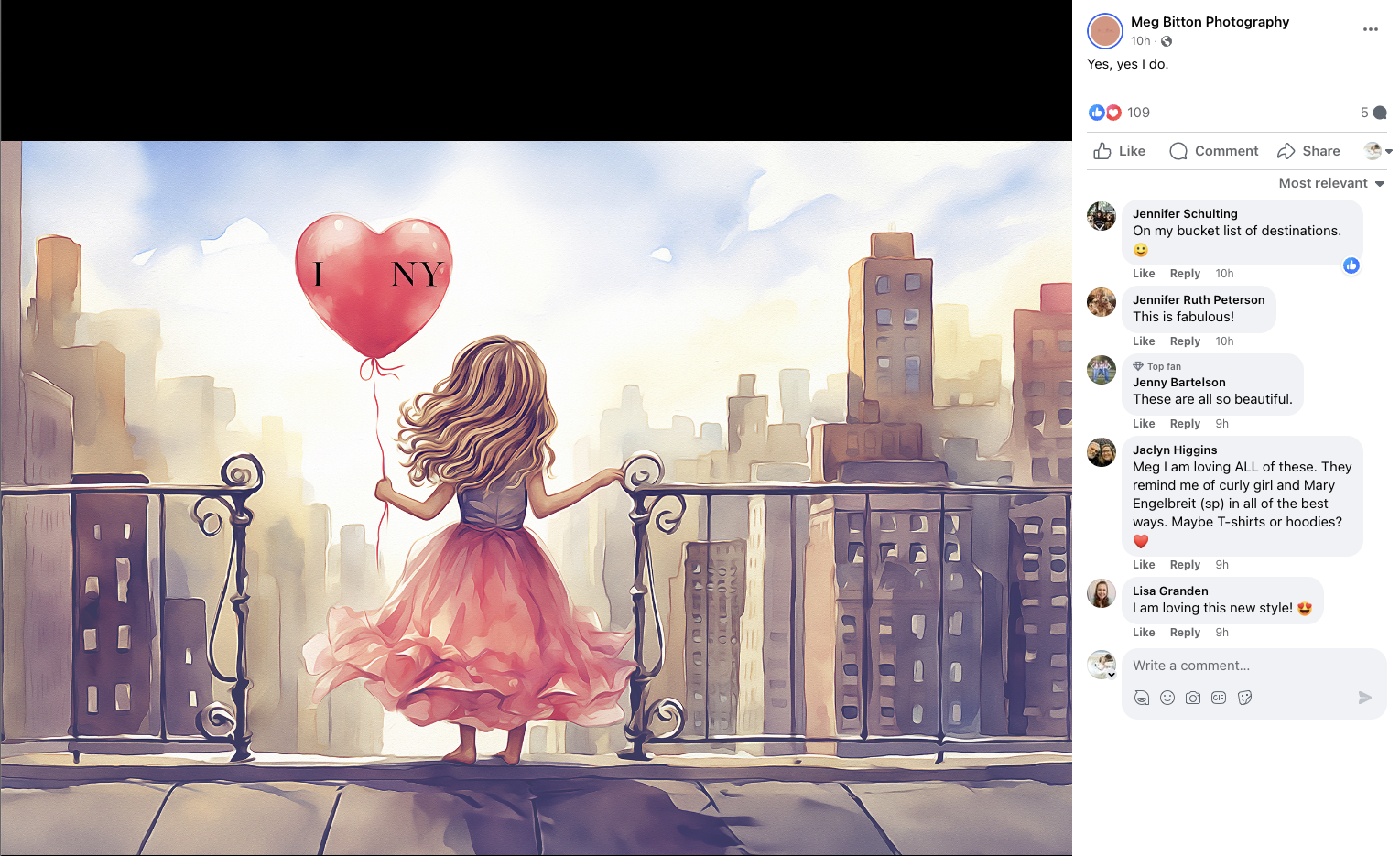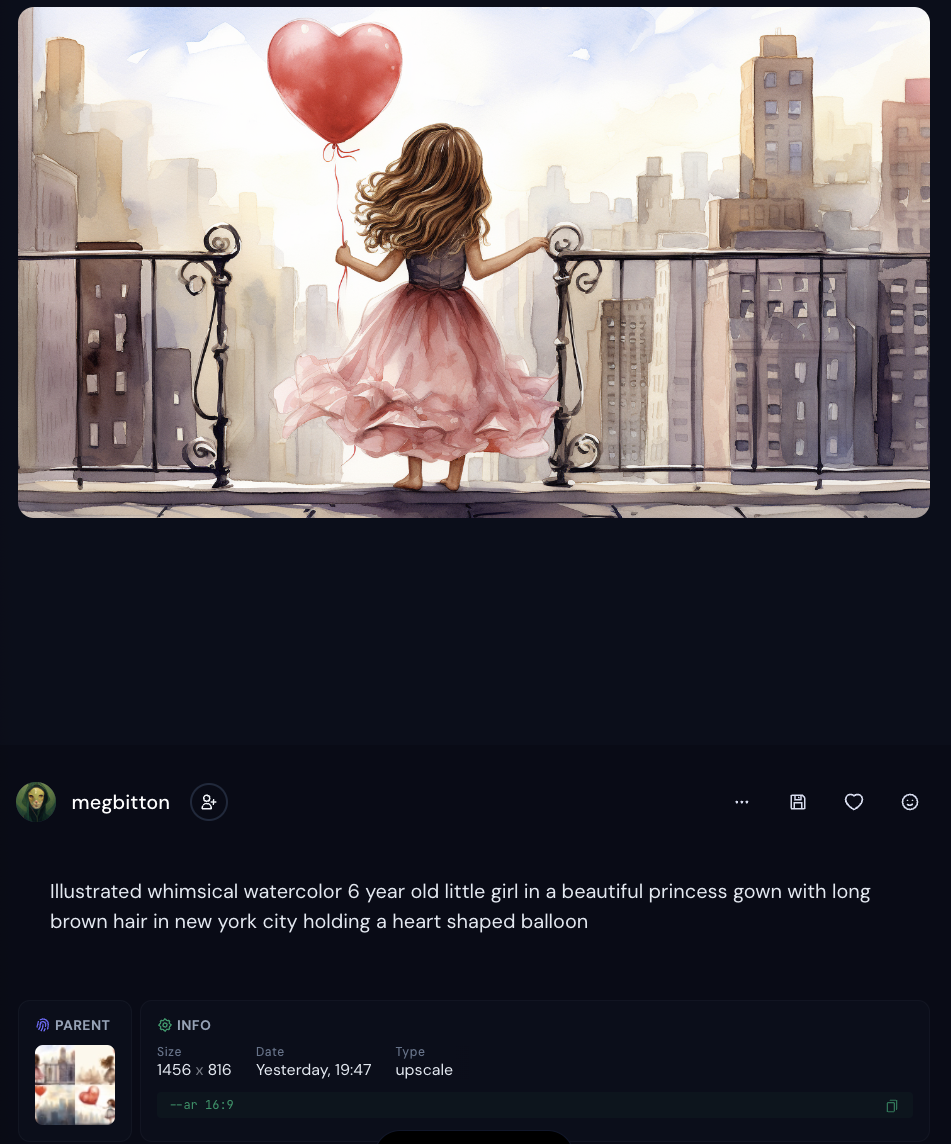AI in Art and the Ethical Issue of Selling AI-Generated Work as Your Own (A.K.A; Don’t do a meg bitton)
In the ever-evolving world of art and photography, there's a constant balance between innovation and ethical considerations. Recently, Meg Bitton (for you laymen; child photographer in the US, often causing a stir in the industry from posing children in suggestive scenarios, inappropriate props, plagerism… she has whole sections of the interenet dedicated to her drama), has come under scrutiny yet again; this time for her use of artificial intelligence (AI) in creating what she presents as her original watercolor Photoshop "assets.".
From my view point, it is fine for us to play around with AI but when it comes to passing off AI work as our own then that is where people are crossing the line. This example urges us to delve into profound questions about the intersection of art, copyright, and ethical standards within our creative community.
Before we dive into the Meg Bitton controversy, it's essential to introduce you to the source of these allegations – 'Photo Stealers.' This online site is dedicated to spotlighting instances of image theft and copyright violations in the realm of photography and art. With thorough research, they aim to uncover potential breaches of intellectual property. I’ve been a big fan of theirs for a while, admittedly sometimes I have felt that they can be a little harsh, especially with newer photographers who may not fully understand plagerism and theft in the art community- on the most part however, just don’t steal work?!
Meg Bitton's Alleged Use of AI
Meg Bitton, a well-known personality in the photography world, faced increased scrutiny when Photostealers claimed she was using AI to produce her watercolor Photoshop assets, which are PNG images that can be sold individually.
Cleverly, Photostealers were able to see exactly what Meg Bitton was creating on Midjourney’s Discord, as it is an open platform.
Cleverly, Photostealers were able to see exactly what Meg Bitton was creating on Midjourney’s Discord, as it is an open platform. They could see the exact 'assets that she was selling (she was creating images, removing backgrounds, turning them into .png files and then selling them, indicating that she was painting them). Not only that but she was claiming that she had been receiving commisions from people for these watercolours.
At the core of this controversy lies the complex issue of copyright when it comes to AI-generated artwork. Presently, legal opinions vary, with different courts holding different views. The dominant perspective, upheld by the Supreme Court, argues that AI-generated art doesn't qualify for copyright protection due to the absence of human authorship. Yet, a lively debate continues, exploring whether the involvement of human input, like providing prompts or refining AI-generated results, might make the work eligible for copyright.
In response to these allegations, Meg Bitton strongly denied any involvement of AI in her creative process. She firmly maintained that her unique artistic vision and technical expertise were solely responsible for the creation of these assets. Her argument rested on her use of Photoshop actions and her artistic skills to achieve the final results.
Despite Meg Bitton's strong denial of AI involvement, skeptics have pointed out certain elements that cast doubt on her stance (seriously, at this point there is not denying it- go read the photostealers blog!). Some of these include:
Recognizable AI Features: Observers have identified visual cues in her artwork that align with features typically linked to AI-generated content. These include unusual anomalies like extra fingers and elements that go beyond conventional realism.
Ease of Replication: Others have attempted to recreate similar images using Photoshop actions, showing that it's relatively simple to achieve results similar to Meg Bitton's alleged AI-generated art.
Platform Complexity: Adding to the intricacies of the situation, Meg Bitton uses a platform that has faced legal challenges, including a class-action lawsuit. This platform allows users to access and use creations without copyright protection, raising ethical questions about her association with it.
At the heart of this controversy lies the ethical dilemma of reselling AI-generated products as your own handcrafted creations. This issue has sparked a broader conversation within the creative community, focusing on several key ethical considerations:
Transparency: Openness and honesty are at the core of ethical practice. When artists use AI tools or software in their work, it's crucial to acknowledge this involvement. Failing to do so can mislead the audience and undermine trust in the authenticity of the creative process.
Authenticity and Value: Selling AI-generated products as your original work raises questions about the authenticity and value of the art. It may diminish the efforts of artists who create art manually or with minimal technological assistance.
Fair Compensation: If an artist uses AI tools to create their work, ethical questions arise about whether they should receive the same compensation for their creations as those who craft art without extensive technological assistance. Reselling AI-generated products without disclosure can be seen as unfair to consumers.
The debate surrounding Meg Bitton's alleged use of AI in creating her watercolor Photoshop assets underscores the ever-evolving landscape of art, copyright, and ethical principles in our digital age. As the legal status of AI-generated art remains uncertain, this case emphasizes the critical significance of transparency and ethical responsibility within the creative industry. The ethical implications of reselling AI-generated work as your own original creations spark an essential conversation within the artistic community, urging artists and photographers to reflect on their practices and uphold broader principles of integrity and transparency.
ALSO- final applause to photostealers for linking to the '“assets” for people to download. This did make me laugh!
FINAL THOUGHT: don’t. steal. photos.
(or anything else)


